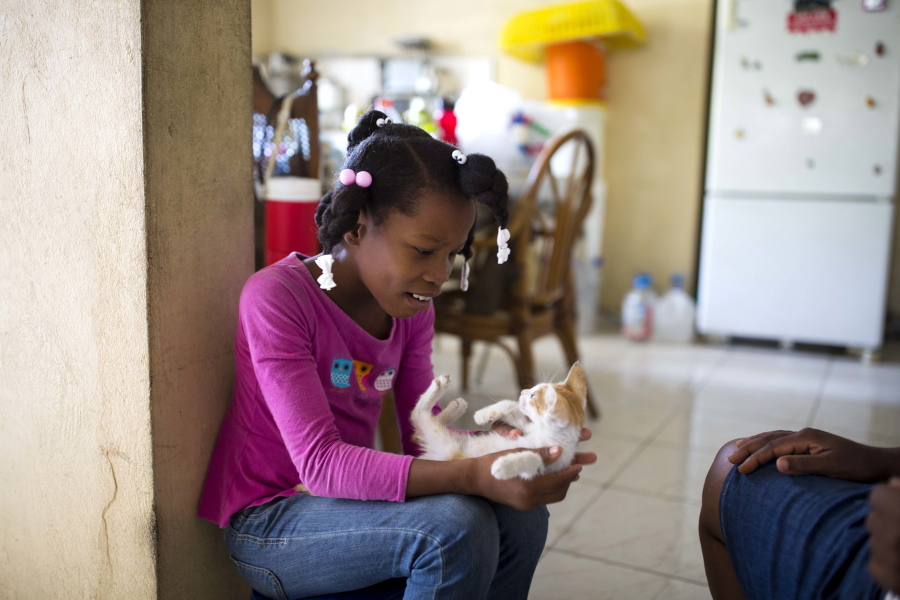PORT-AU-PRINCE, Haiti — Like roughly a quarter of Haiti’s children, 11-year-old Franchina has spent much of her short life without parents.
Her mother dead, her father in prison, Franchina was placed in a state-run orphanage as a toddler, remaining illiterate year after year and seemingly destined for a hard life in the Western Hemisphere’s poorest nation.
But this year, Franchina’s fortunes took a hopeful turn.
She has benefited from the newfound resolution of Haiti’s government to improve the deplorable status of the country’s children, and more specifically from a partnership between the state child welfare agency and several international child-service organizations.
In a country and region with no tradition of formal foster-care systems, they are recruiting and training Haitians who buy into the idea that being a foster parent is a noble mission.
“There’s a certain satisfaction to it,” said Jeannes Pierre, 61, a Baptist pastor in Port-au-Prince who is now Franchina’s foster father. “It’s doing something extraordinary.”
In her orphanage, Franchina shared a bunkroom with many other children. Now she has a bedroom to herself, small and simple but enlivened by a colorful stack of books. To her delight, her foster parents taught her how to read within weeks of her arrival.
“It’s like removing the darkness from the eyes of a child,” Pierre said.
The Pierres do not know how long Franchina will be with them. “We want to keep her as long as possible,” Pierre said. And Franchina, it seems, would agree.
Asked what she likes best about her new life, at first she was too shy to respond.
Then she confided: “I like everything.”
Many of Haiti’s youths live on the streets; hundreds of thousands are domestic workers in other families’ homes. Franchina was among the 30,000 or so consigned to orphanage-like institutions ranging in quality from adequate to abominable.
By itself, foster care won’t come close to resolving the plight of Haiti’s children. Long-term solutions are needed that for now are beyond the government’s financial reach — notably, better educational opportunities and social supports so poor families don’t feel compelled to place their children in orphanages or domestic servitude in the first place.
But the new program is cited by Haitian and foreign experts as evidence of the government’s determination to modernize and strengthen an array of child-oriented policies and practices — and lessen reliance on foreign-based charities and mission groups.
“There’s no magic bullet, no one solution,” said Marc Vincent, who heads UNICEF’s operations in Haiti. “But it’s important to recognize the steps the government is taking — it is passionate about making things better.”
Some of the changes derive from the island’s devastating 2010 earthquake, which fueled a surge of international adoptions, primarily to the United States. Some Haitian children were airlifted to the U.S. even though they were not approved for adoption; an Idaho church group leader was convicted of arranging illegal travel after trying to take other children out of Haiti without government approval.
Such incidents prompted Haitian authorities to sign an international convention setting ethical standards for international adoptions. Regulations were tightened and the number of international adoptions from Haiti fell sharply, from more than 1,300 a year to around 300 or 400.
The child welfare agency — known by its French initials, IBESR — also is trying to beef up oversight of Haiti’s roughly 750 orphanages. Most are privately run and financed, operating with little or no government regulation to rein in abuse and neglect.
Thus far, just a few of the orphanages have been shut down, but IBESR officials say about 400 are targeted for closure unless they meet a deadline for swift improvements. Large-scale closures will increase pressure on the government to reunify affected children with their biological parents, and to find foster homes when reunification proves impossible.
“We can’t go on placing kids in institutions,” said Vanel Benjamin, IBESR’s foster-care coordinator. “The answer is family.”
UNICEF estimates that 80 to 90 percent of the children in orphanages have one or two living parents. Lumos, the nonprofit founded by Harry Potter author J.K. Rowling, is among several groups seeking to reunite some of those children with their biological families, but the work is slow and the orphanage operators — often recipients of donations from well-meaning foreigners — are not always cooperative.
“They don’t want to change,” said Eugene Guillaume, Haiti program manager for Lumos. “Orphanages are their business.”
In the United States, there’s a constant struggle to recruit foster parents even though they’re generally paid many hundreds of dollars a month. In Haiti, the plan is to build a foster care system exclusively with parents willing to take on the task at their own expense.



